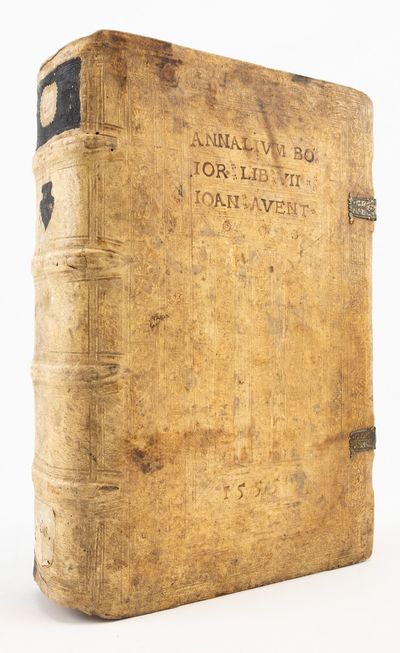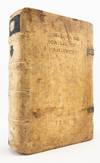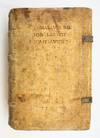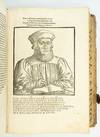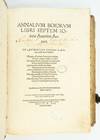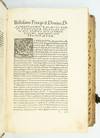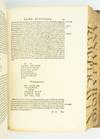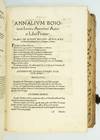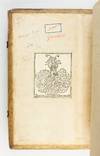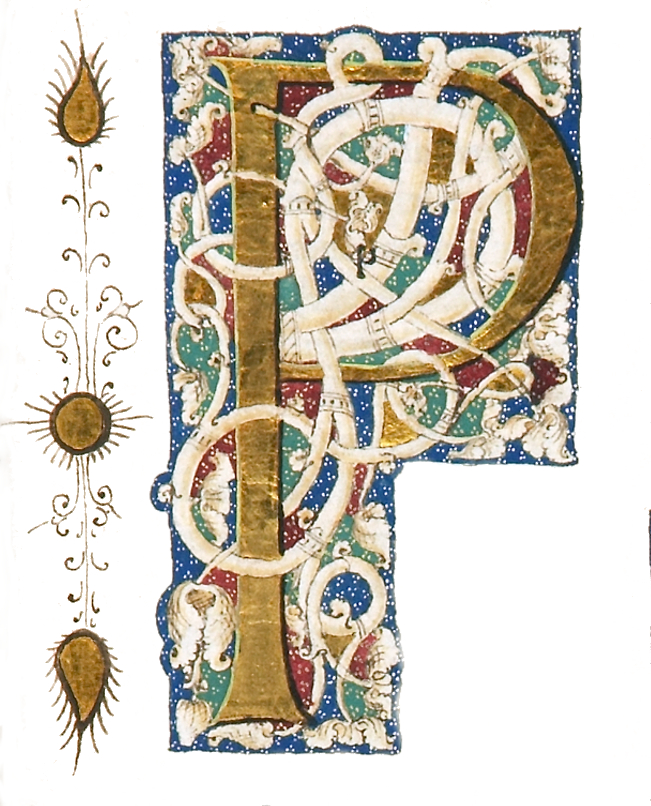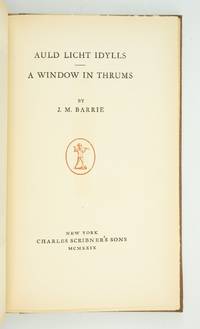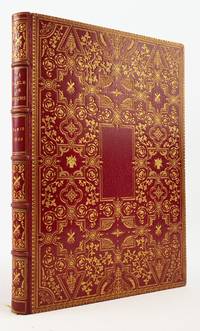1554 · Ingolstadt
by (BAVARIAN HISTORY). (BINDINGS - 16TH CENTURY PIGSKIN). AVENTINUS [TURMAIR, JOHANNES]
Ingolstadt: Alexander & Samuel Weissenhorn, 1554. FIRST EDITION. 363 x 238 mm. (14 1/4 x 9 1/2"). 30 p.l., 835 pp.Edited by Hieronymus Ziegler.
Contemporary blind-stamped pigskin over bevelled wooden boards, covers decorated with rolls featuring biblical figures, upper cover with title lettered in ink and the date 1555, raised bands, one spine panel painted black and with a later paper library label, another panel with black painted ornament, tail compartment with remnants of early paper shelf label, two brass catchplates, one (of two) brass clasps, fore edge with title thickly lettered in ink. With a large woodcut portrait of the author. Front pastedown with contemporary woodcut bookplate of Sebastian Hoflinger; title page with ink inscription of the Monastery of St. Mang of Füssen. VD16 T 2318; Adams A-2308; USTC 611635. Extremities somewhat worn, pigskin rather soiled and marked, but the unrestored contemporary binding entirely solid and very pleasing in its antiquity. Thin, faint dampstain to tail edge of leaves, occasional insignificant stains or thumbing, M4 with three-inch piece torn away in bottom margin (not affecting text), other trivial imperfections, but an especially clean and fresh copy internally.
In an attractive period binding and with monastic provenance, this is an excellent copy of a universal European history as well as a local annal of Bavaria, representing the author's monumental effort to chronicle Bavaria's past and to showcase the region's position down through the ages. The work begins with ancient times, weaving legendary material about the Germans and Bavarians into the story of Rome, ancient Judaism, and early Christianity, and continues until the author's own time. While the ancient material is largely fictitious (such as the succession of Teutonic kings stretching back to the Great Flood), the treatment of Medieval material displays a careful and critical historiographic approach, and reproduces portions of early period texts that are otherwise lost. Our author, Johann Thürmeyer (1477-1534), was born in the small Bavarian town of Abensperg, which led him to take the Latinized name of Aventinus. The son of an innkeeper, he was educated at Ingolstadt and Paris, and taught mathematics in Polish Krakow as well as literature in Vienna. In 1512 he returned to Bavaria to educate the two younger brothers of Duke Wilhelm IV. He composed these "Bavarian Annals," a product of many years labor, for his pupils, finishing in 1521. Aventinus was something of a radical: he had open Humanist sympathies, and was critical of the Church, agreeing with the Reformers' opinions on issues such as indulgences. His anti-Catholic attitudes resulted in a 20-year publication delay: the present first edition could not be printed until several passages critical of the Church were removed. Still considered too controversial, it was put on the Index Librorum Prohibitorum by the Council of Trent in 1563, and might have faded into obscurity had Albrecht V, Duke of Bavaria (1528-79) not intervened. Recognizing the value of the work, he commissioned a further revised edition, and included it in his list of recommendations for monastic acquisitions. Fittingly, our copy is from the library of the Bavarian monastery of St. Mang (also Magnus) in Füssen, a Benedictine house which operated from the 9th century until the post-Napoleon period of dissolution. Their inscription, dated 1600, indicates that the monastery was likely the second owner of this copy, probably following Austrian nobleman Sebastian Höflinger (1533-84), whose striking woodcut bookplate graces the front pastedown. Höflinger was Chancellor of the Archbishop of Salzburg, and the recipient of many Imperial honors that improved his family's aristocratic status, including the right to a knightly fief and the "ius cerae rubeae," the privilege to seal his letters with red wax. The thick, bold titling on the fore edge of the book block here is an almost startling reminder that early books were stored on their sides, before the evolution of library design led to the space saving of upright spines.. (Inventory #: ST20473)
Contemporary blind-stamped pigskin over bevelled wooden boards, covers decorated with rolls featuring biblical figures, upper cover with title lettered in ink and the date 1555, raised bands, one spine panel painted black and with a later paper library label, another panel with black painted ornament, tail compartment with remnants of early paper shelf label, two brass catchplates, one (of two) brass clasps, fore edge with title thickly lettered in ink. With a large woodcut portrait of the author. Front pastedown with contemporary woodcut bookplate of Sebastian Hoflinger; title page with ink inscription of the Monastery of St. Mang of Füssen. VD16 T 2318; Adams A-2308; USTC 611635. Extremities somewhat worn, pigskin rather soiled and marked, but the unrestored contemporary binding entirely solid and very pleasing in its antiquity. Thin, faint dampstain to tail edge of leaves, occasional insignificant stains or thumbing, M4 with three-inch piece torn away in bottom margin (not affecting text), other trivial imperfections, but an especially clean and fresh copy internally.
In an attractive period binding and with monastic provenance, this is an excellent copy of a universal European history as well as a local annal of Bavaria, representing the author's monumental effort to chronicle Bavaria's past and to showcase the region's position down through the ages. The work begins with ancient times, weaving legendary material about the Germans and Bavarians into the story of Rome, ancient Judaism, and early Christianity, and continues until the author's own time. While the ancient material is largely fictitious (such as the succession of Teutonic kings stretching back to the Great Flood), the treatment of Medieval material displays a careful and critical historiographic approach, and reproduces portions of early period texts that are otherwise lost. Our author, Johann Thürmeyer (1477-1534), was born in the small Bavarian town of Abensperg, which led him to take the Latinized name of Aventinus. The son of an innkeeper, he was educated at Ingolstadt and Paris, and taught mathematics in Polish Krakow as well as literature in Vienna. In 1512 he returned to Bavaria to educate the two younger brothers of Duke Wilhelm IV. He composed these "Bavarian Annals," a product of many years labor, for his pupils, finishing in 1521. Aventinus was something of a radical: he had open Humanist sympathies, and was critical of the Church, agreeing with the Reformers' opinions on issues such as indulgences. His anti-Catholic attitudes resulted in a 20-year publication delay: the present first edition could not be printed until several passages critical of the Church were removed. Still considered too controversial, it was put on the Index Librorum Prohibitorum by the Council of Trent in 1563, and might have faded into obscurity had Albrecht V, Duke of Bavaria (1528-79) not intervened. Recognizing the value of the work, he commissioned a further revised edition, and included it in his list of recommendations for monastic acquisitions. Fittingly, our copy is from the library of the Bavarian monastery of St. Mang (also Magnus) in Füssen, a Benedictine house which operated from the 9th century until the post-Napoleon period of dissolution. Their inscription, dated 1600, indicates that the monastery was likely the second owner of this copy, probably following Austrian nobleman Sebastian Höflinger (1533-84), whose striking woodcut bookplate graces the front pastedown. Höflinger was Chancellor of the Archbishop of Salzburg, and the recipient of many Imperial honors that improved his family's aristocratic status, including the right to a knightly fief and the "ius cerae rubeae," the privilege to seal his letters with red wax. The thick, bold titling on the fore edge of the book block here is an almost startling reminder that early books were stored on their sides, before the evolution of library design led to the space saving of upright spines.. (Inventory #: ST20473)
